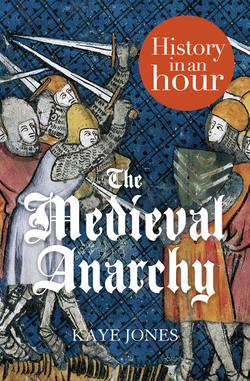Читать книгу The Medieval Anarchy: History in an Hour - Kaye Jones, Kaye Jones - Страница 10
ОглавлениеThe Rise of Matilda
A major turning point in King Stephen’s reign was marked by the defection of Robert, Earl of Gloucester, to Matilda’s side in May 1138. From this point on the country descended rapidly into anarchy, chaos, and civil war. Whether he was stirred by familial affection for his half-sister or suffered an attack of conscience after breaking his many oaths, we will never know. More important than the reasons, however, are the consequences of this act.
The conflict began with a series of major rebellions that broke out in southwest England, possibly inspired by Robert’s defection. Stephen acted swiftly to crush the revolts and laid successful sieges at Hereford, Shrewsbury, Castle Cary, and Harptree but was unable to take Robert’s stronghold of Bristol. The Welsh Marches, including Dudley and Ludlow, along with Dover, another of Robert’s castles, also revolted against Stephen but were quickly brought back under royal control.
Though these rebellions were relatively small, they demonstrate the extent of Robert’s influence. As the chronicle, Gesta Stephani, states:
[the rebels] were bound to the earl [Robert] by ties of friendship, firmly united with him by pledge and oath, and so much his allies by compact and homage that as soon as they learned he wished to rebel against the king’s power, they joined in his rebellion promptly and by agreement.
The defection of one man had brought Matilda the strength and might of the southwest of England.
Second Lateran Council
In early 1139, Matilda launched her first direct attack on Stephen by writing to the Papal court in Rome. As the highest authority in Medieval Europe, Matilda knew that securing this support for her claim was crucial to becoming queen of England. The Papal court agreed to hear the case and discussions opened on 4 April 1139 at a meeting known as the Second Lateran Council. Neither Matilda nor Stephen attended in person but each sent representatives to appear on their behalf.
Pope Innocent II, convened the Second Lateran Council
The Pope, with whom all decisions lay, neither adjourned nor passed judgement on the case. This created a situation whereby Stephen continued to rule and Matilda was left anxious and frustrated. In fact the Pope never made a formal decision on the English succession. Perhaps he hoped that Stephen and Matilda might come to some agreement on their own. The Pope’s indecision only strengthened Matilda’s resolve to reclaim her inheritance by force, and with the support of Robert, the decision was made to take the fight directly to Stephen in England.
